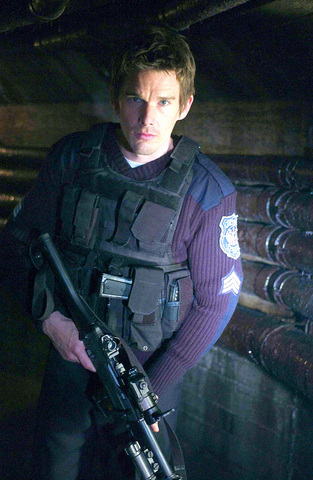The new Assault on Precinct 13, which stars Ethan Hawke and Laurence Fishburne, is a remake of the Assault on Precinct 13 directed by John Carpenter in 1976, two years before he made Halloween.
It should be noted that the old Precinct 13, a scruffy and unshowily artful exercise in low-budget mayhem, was not alto-gether new at the time. Its premise -- a motley assortment of cops and crooks holding off a brutal, endless siege in a lonely police station -- owed a lot to George A. Romero's Night of the Living Dead (1968) and also to Howard Hawks' Rio Bravo (1959).
This is a perfectly respectable pedigree, and I do not mean to suggest that you should avoid the new Assault on Precinct 13, directed by Jean-Francois Richet from a screenplay by James DeMonaco, because it's a remake. There are plenty of other reasons. The main one is that the movie cruelly and pointlessly squanders the talents and efforts of its cast as it pushes them through a master class in overacting under duress, rewarding the ones who perform best by killing them off first.

PHOTOS COURTESY OF FOX MOVIES
In place of Carpenter's nasty, efficient B-picture style, Richet, after a swift, mean, promising start, lurches from bursts of gunfire to stretches of tiresome exposition.
His idea of cinematic suavity is a bullet to the head followed by a shot of blood seeping into the snow.
The alarmingly scrawny Hawke, who looks as if his next project should be a public service announcement on the hazards of the Atkins diet, plays Sergeant Jake Roenick, a Detroit policeman still traumatized by an undercover operation that went terribly wrong some months earlier.

Wounded and stressed out, he does desk duty in a rundown police station in a heavily forested, apparently unpopulated section of Detroit, popping pills and stealing nips from a bottle of booze he keeps in his desk. It's New Year's Eve, and the sergeant and his remaining staff -- including a crusty old-timer (Brian Dennehy) and a sexpot receptionist (Drea de Matteo) -- are marking the last hours before the precinct is shut down for good.
Unfortunately for them, a bus carrying a handful of prisoners from someplace to someplace else is forced by a ferocious blizzard to make an unscheduled stop at Precinct 13.
One of the passengers is Marion Bishop, a velvet-voiced crime lord played by Fishburne, who may wish to have a chat with Hawke about the pros and cons of carbohydrates. The subject of diet never comes up, though, since Bishop's presence attracts a platoon of heavily armed assailants, equipped with grenade launchers, night-vision gear and, for the climactic set piece, a helicopter.
Their leader is a weary-looking Gabriel Byrne, and their mission is to terminate Bishop and anyone in his immediate vicinity. Outmanned and outgunned, the mutually mistrustful good guys and bad guys inside the station must hold off the intrepid invaders.
This takes most of the night, and it feels as if it takes most of the new year. Apart from Roenick and Bishop -- who are, you know, complex -- each of the characters defending the precinct is allowed a single defining trait. John Leguizamo is a fast-talking, paranoid drug addict; Maria Bello is a high-strung police-department psychiatrist (on hand to treat Roenick's psychic wounds), whose response to danger is to recite multiplication tables. Aisha Hinds and the rap star Ja Rule play expendable African-American criminals, while Dorian Harewood fulfills the same function on the other side of the law.
The main thing this Assault lacks is a point. Carpenter's film, like other action and horror movies of the 1970s, still resonates with the political paranoia and social unease of the era. Carpenter's cynical refusal to distinguish clearly between good guys and bad guys feels freshly unsettling, while Richet's "modernization" looks like something we've seen 100 times before.

One of the biggest sore spots in Taiwan’s historical friendship with the US came in 1979 when US president Jimmy Carter broke off formal diplomatic relations with Taiwan’s Republic of China (ROC) government so that the US could establish relations with the People’s Republic of China (PRC). Taiwan’s derecognition came purely at China’s insistence, and the US took the deal. Retired American diplomat John Tkacik, who for almost decade surrounding that schism, from 1974 to 1982, worked in embassies in Taipei and Beijing and at the Taiwan Desk in Washington DC, recently argued in the Taipei Times that “President Carter’s derecognition

This year will go down in the history books. Taiwan faces enormous turmoil and uncertainty in the coming months. Which political parties are in a good position to handle big changes? All of the main parties are beset with challenges. Taking stock, this column examined the Taiwan People’s Party (TPP) (“Huang Kuo-chang’s choking the life out of the TPP,” May 28, page 12), the Democratic Progressive Party (DPP) (“Challenges amid choppy waters for the DPP,” June 14, page 12) and the Chinese Nationalist Party (KMT) (“KMT struggles to seize opportunities as ‘interesting times’ loom,” June 20, page 11). Times like these can

June 23 to June 29 After capturing the walled city of Hsinchu on June 22, 1895, the Japanese hoped to quickly push south and seize control of Taiwan’s entire west coast — but their advance was stalled for more than a month. Not only did local Hakka fighters continue to cause them headaches, resistance forces even attempted to retake the city three times. “We had planned to occupy Anping (Tainan) and Takao (Kaohsiung) as soon as possible, but ever since we took Hsinchu, nearby bandits proclaiming to be ‘righteous people’ (義民) have been destroying train tracks and electrical cables, and gathering in villages

Dr. Y. Tony Yang, Associate Dean of Health Policy and Population Science at George Washington University, argued last week in a piece for the Taipei Times about former president Ma Ying-jeou (馬英九) leading a student delegation to the People’s Republic of China (PRC) that, “The real question is not whether Ma’s visit helps or hurts Taiwan — it is why Taiwan lacks a sophisticated, multi-track approach to one of the most complex geopolitical relationships in the world” (“Ma’s Visit, DPP’s Blind Spot,” June 18, page 8). Yang contends that the Democratic Progressive Party (DPP) has a blind spot: “By treating any